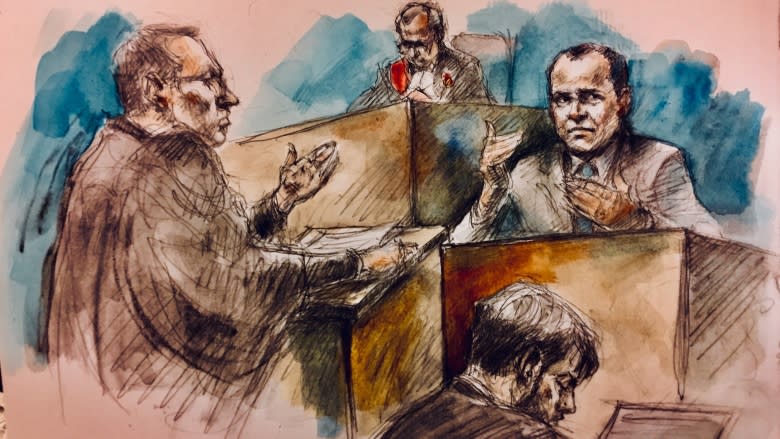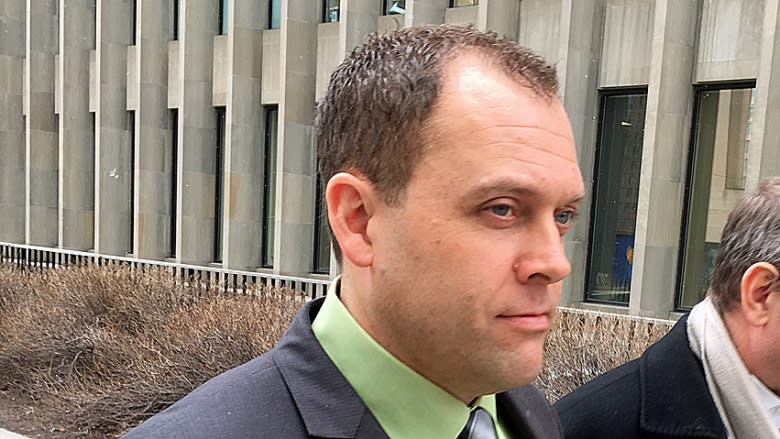Corruption trial jury faces choice of believing accused cop or drug dealer witness
Hamilton police officer Craig Ruthowsky will soon know his fate.
And it will depend largely on whether the drug dealer who was the Crown's key witness is seen by jurors as truthful or a self-serving liar.
After five weeks of testimony and dozens of witnesses, defence lawyer Greg Lafontaine and assistant Crown attorney John Pollard both gave their closing addresses to the jury Wednesday, as Ruthowsky's trial comes to a close, each selling a different take on the drug dealer.
Ruthowsky, 44, is accused of selling police secrets and protection for $20,000 monthly payments from a cadre of drug dealers.
The 17-year-veteran of Hamilton police has pleaded not guilty in Superior Court in Toronto to charges of bribery, attempting to obstruct justice, trafficking cocaine, criminal breach of trust, and conspiring to traffic marijuana.
Lafontaine spoke to the jury first, and implored them to believe that the drug dealer who testified against his client was a manipulative liar, who twisted the truth to get what he wanted.
He was Crown's key witness — the drug dealer who testified that he was the one who brokered the deal with Ruthowsky.
He can't be named because of a publication ban.
"Let him live in his fantasy land with his fellow criminals," Lafontaine said.
"Don't convict my client on the basis of evidence that is motivated by his own selfish interests, that has nothing to do with the truth."
He said, she said
Pollard, by contrast, told the jury that the dealer was a "compelling, truthful witness," whose testimony "holds up surprisingly well to close scrutiny."
"[He] isn't selling a fiction," Pollard said.
Essentially, the jury's decision boils down to a "he said, she said" situation. Three different former drug dealers with lengthy criminal pasts have alleged that Ruthowsky was a cop on the take, who let them roam free and sell drugs in Hamilton.
Ruthowsky, by contrast, has testified that the dealers were feeding him information as informants, while he strung them along with minor assistance in the form of "perceived benefit."
"The evidence against Craig Ruthowsky depends almost entirely on the word of three career criminals," Lafontaine said, adding that the dealer made up these allegations to save his own skin after he was arrested as part of Toronto police's massive guns and gangs investigation dubbed "Project Pharaoh."
Pollard said that the jury does not have to specifically decide one way or the other on both accounts — the dealer could both be an informant, and in a corrupt relationship.
"Those inferences are not mutually exclusive," he said.
Each day, a contingent of Ruthowsky's family and friends have sat in court watching the proceedings, including his wife, who is also a Hamilton police officer. On Wednesday, their numbers swelled, as the closing addresses mark the end of the trial.
They sat there quietly as Pollard told the jury that Ruthowsky couldn't be trusted. Some family members shook their heads as he spoke.
Pollard said Ruthowsky "bragged," and gave "extemporized" evidence based on hearsay.
"He gave opinion as if it were fact," Pollard said, adding that Ruthowsky "refused to accept patently obvious facts."
Touching on unexplained income
Lafontaine also addressed the thousands of dollars in "unexplained income" that court has heard was sitting in Ruthowsky's bank accounts. He said part of the problem was the Crown's forensic accounting expert didn't have all the records she needed to do a complete job.
"It's not damning evidence of guilt," he said. "This is she didn't have enough records."
"There's no unexplained, serious, nefarious income, at all."
Lafontaine also said some of the unexplained income came from Ruthowsky "working hard on the side" on his pool business, trying to help his family get ahead.
The problem, he told the jury, is that he did a lot of cash deals, and didn't claim some of them on his taxes.
"He didn't report it to the government. He should have, but he didn't," Lafontaine said. "Now it's put him in a difficult spot."
The Crown was much more direct about that issue, calling it "tax evasion," and said Ruthowsky had admitted that he withheld income from the Canada Revenue Agency.
"That is an act of dishonesty," Pollard said.
The judge will give his charge to the jury on Monday, after which, they will be sent out to deliberate on a verdict.
adam.carter@cbc.ca



